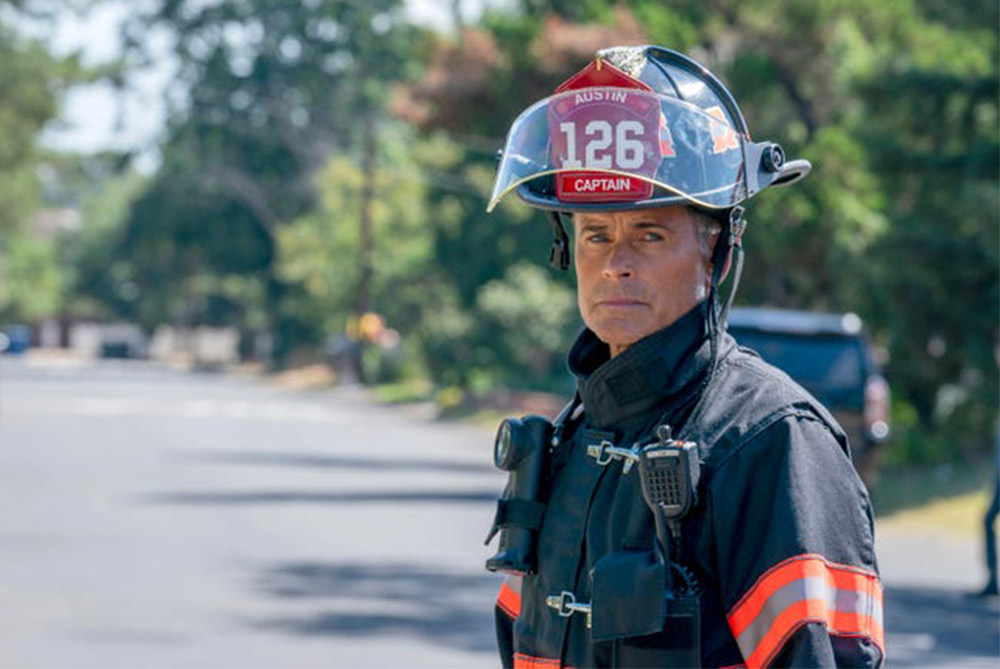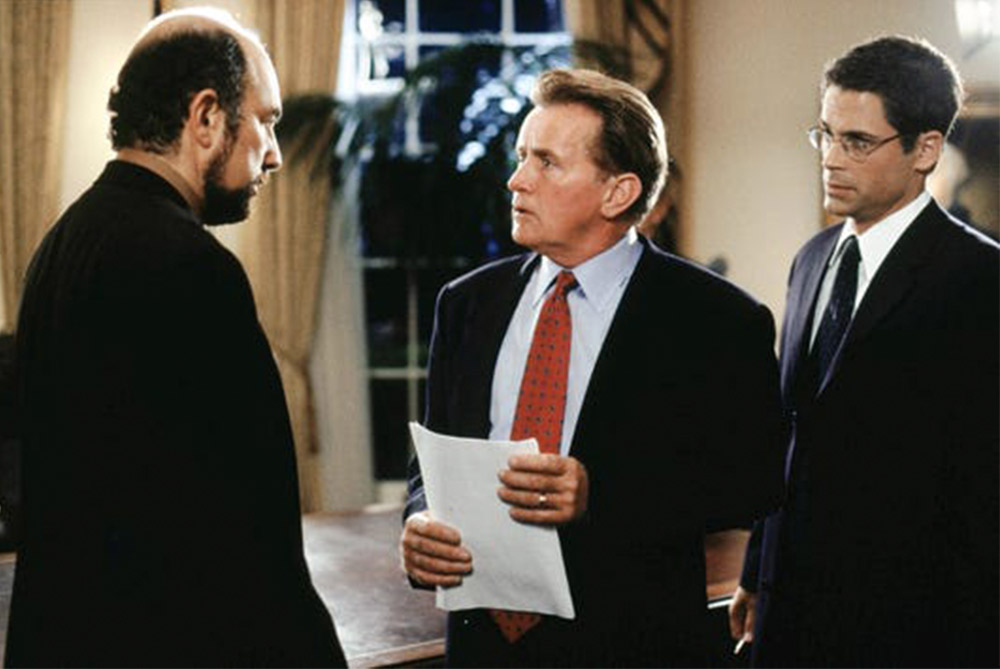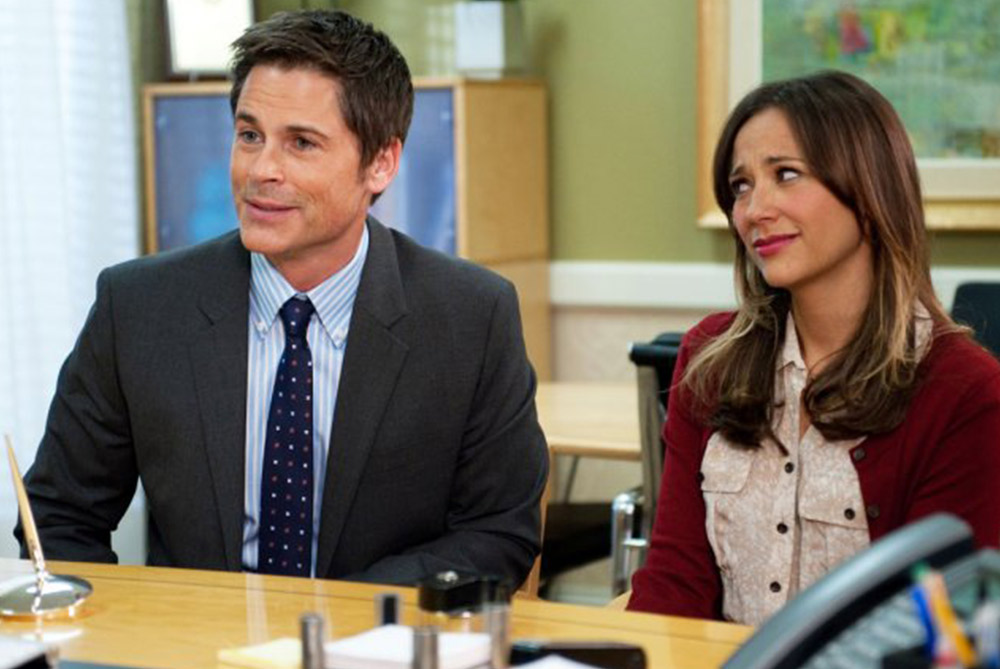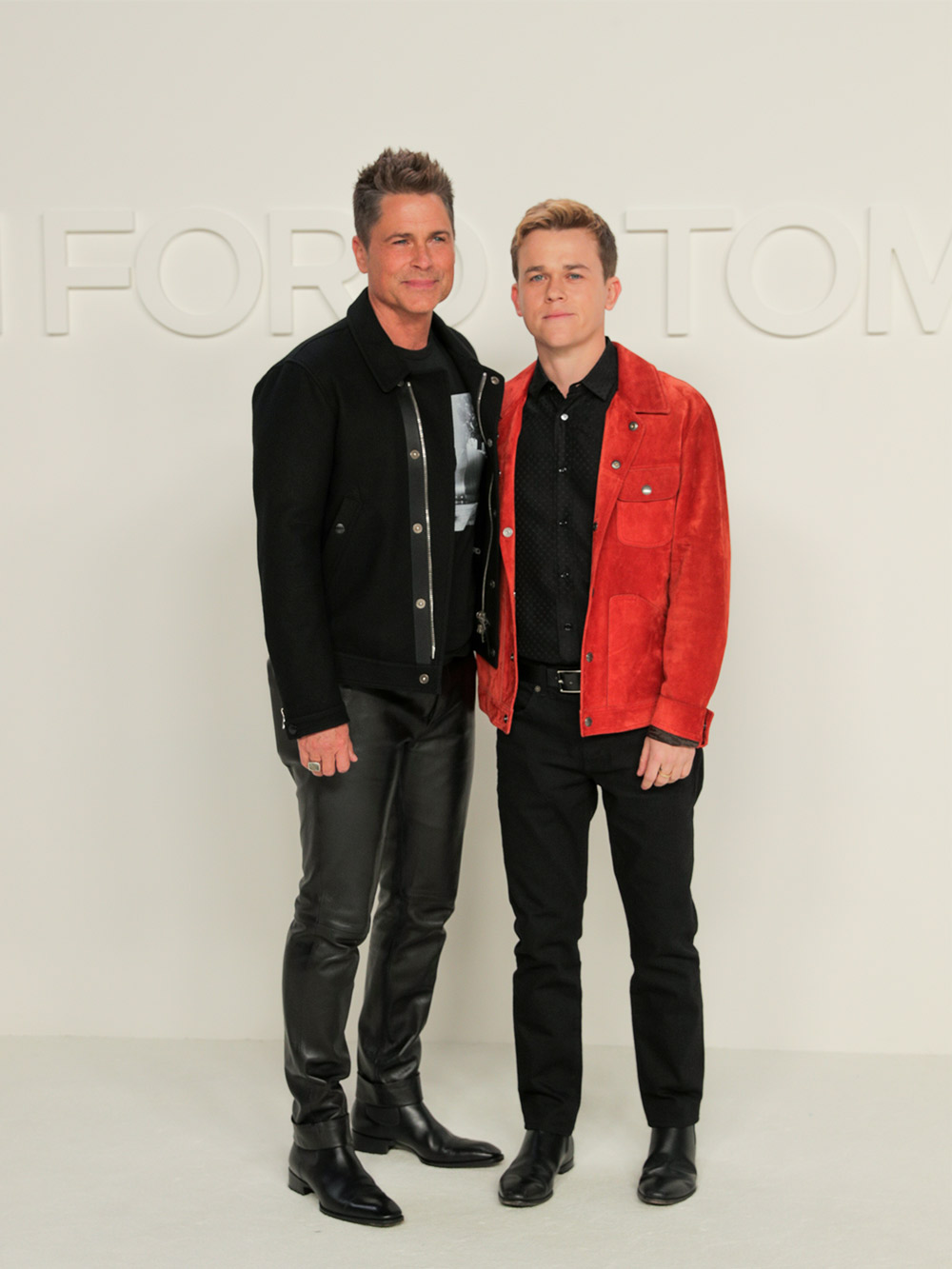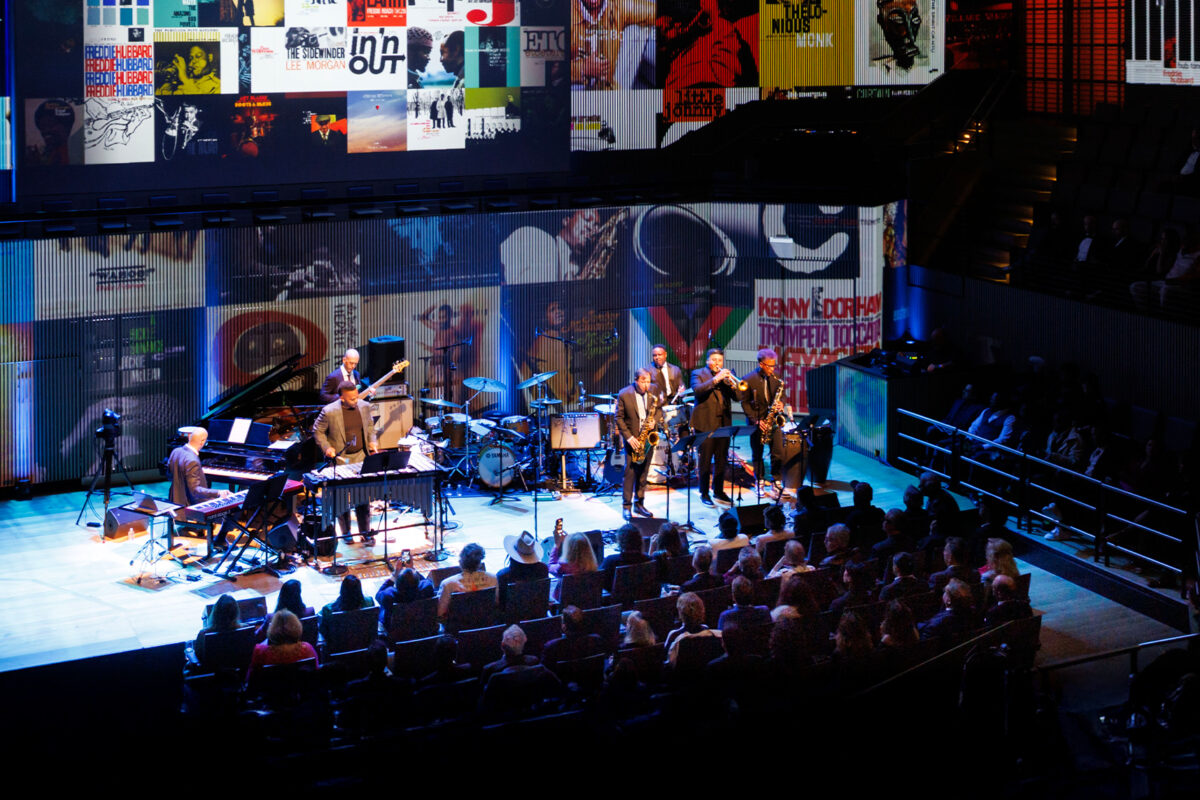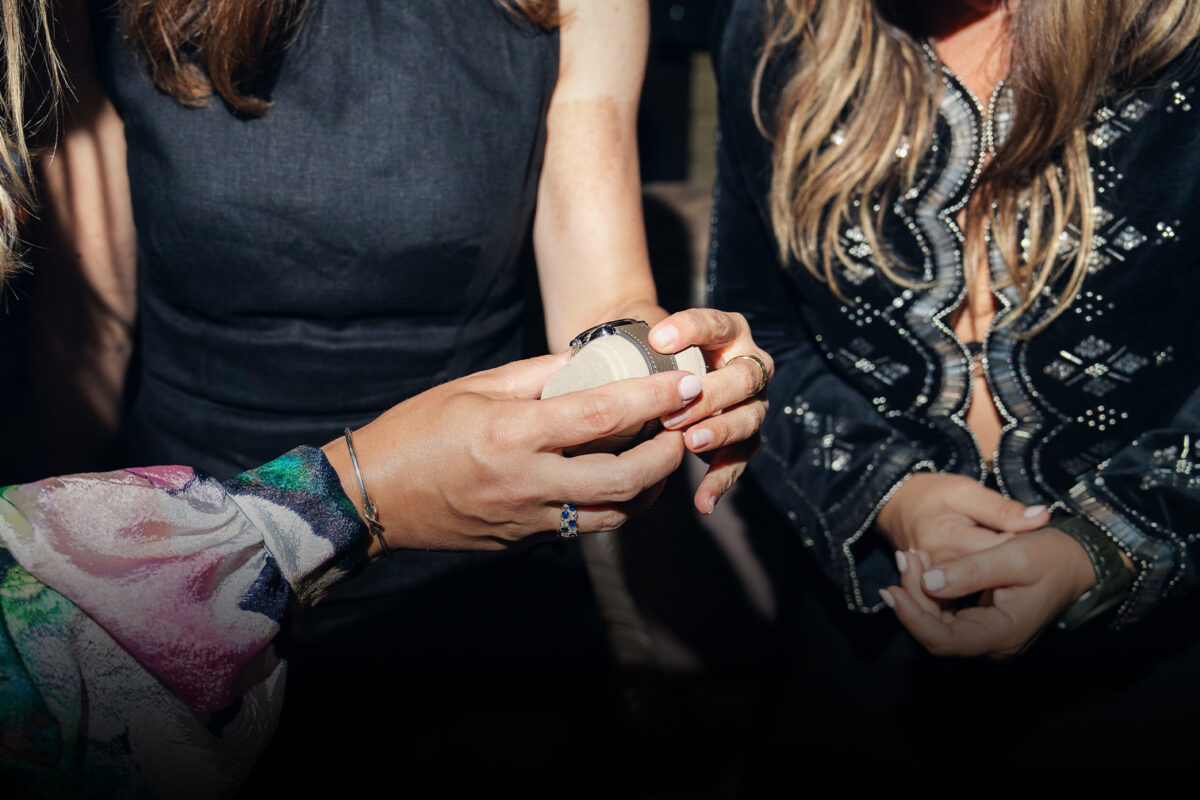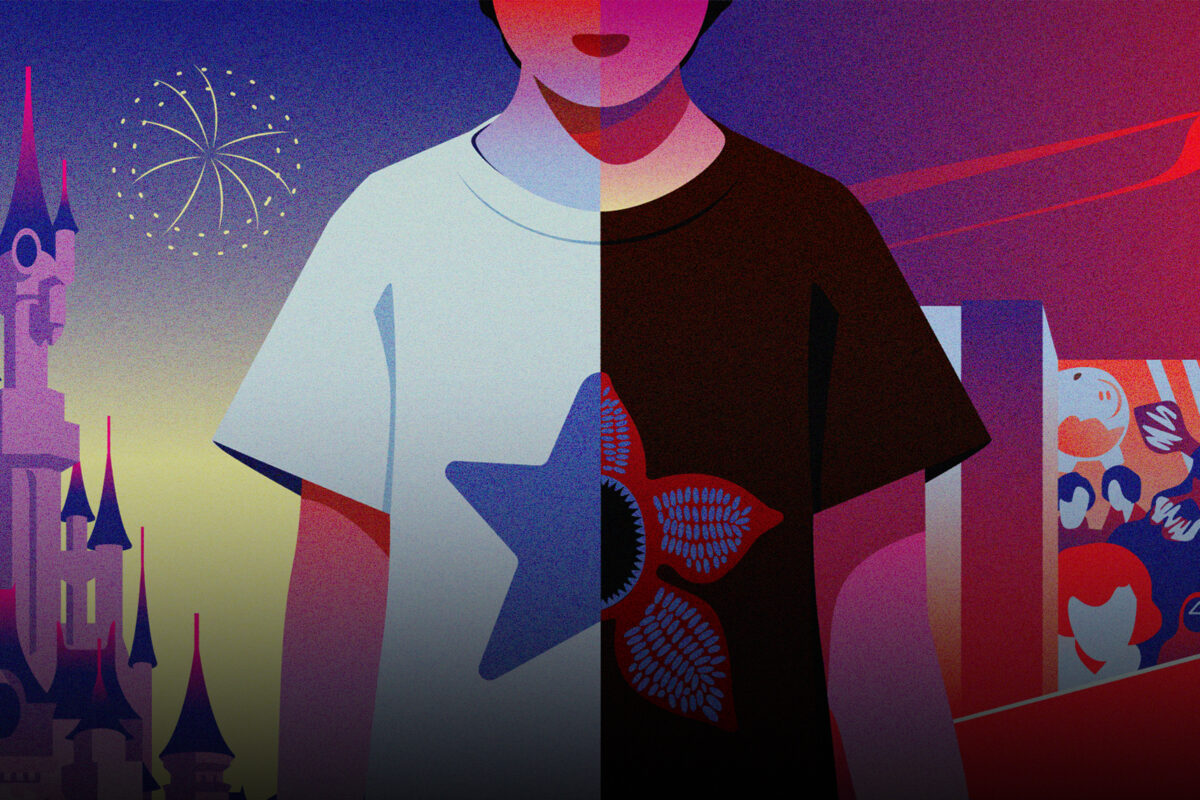As his new podcast drops, we talk to the irrepressibly honest actor about pandemic life, the power of self-deprecation and five decades at the very top
Words by STEPHANIE RAFANELLI
For the last three decades, Rob Lowe — actor, producer, director, writer, cool “buddy” dad and brand-new podcast host — has defied every expectation of a man who, at 56, is still the perfect physical apotheosis of Hollywood actor to become one of the country’s most beloved funny men. And while other pin-ups have bounced in and out of rehab and relationships, Lowe has just celebrated 30 years of sobriety and 29 years of marriage to jewelry designer Sheryl Lowe. How did he do it? By turning the spotlight on his foibles and roasting himself on hot coals after a sex tape was released in 1988, and that is the Rob Lowe who remains our favorite anomalous star.
ROB LOWE, DEMI MOORE and RUMER WILLIS front row at the TOM FORD Fall 2020 fashion show on Feb. 7 in Los Angeles. Photo by Billy Farrell Agency.
Post Brat Pack, Lowe forged a career by flouting and provocatively playing with his Hollywood image. He emerged rather improbably as a comedy genius in Mike Myer’s Wayne’s World (1992) and the Austin Powers movies as evil villain Number Two. He won critical acclaim for his NBC role as terminal-idealist Sam Seaborn in the Aaron Sorkin-scribed The West Wing (earning two Screen Actors Guild Awards) and for his turn as Chris Traeger in comedy series Parks and Recreation, a part that openly spoofed his fitness fanaticism (even when filming, Lowe works out without fail every lunch break). In Ryan Murphy’s 9-1-1: Lonestar on Fox this year, he plays a New York firefighter with an exacting hair and beauty regime.
Of course, Lowe has his own skincare line, Profile. For after 44 years of living on the West Coast (he moved from Dayton, Ohio, to Point Dume, Malibu, when he was 12), Lowe is, superficially at least, every inch the preternaturally youthful, low-carb-consuming, Peloton-primed, surfing, dog-loving, ripped Californian film star, as well as “Dad” to Matthew, 27, a law graduate, and John Owen (or “Johnny”), 25, a Stanford graduate who is currently working on the 9-1-1: Lonestar writing team and who has just announced his own sobriety.
This summer comes Lowe’s podcast, Literally … With Rob Lowe, produced by his friend Conan O’Brien’s team and which promises to be a characteristically no-holds-barred romp. In each episode, Lowe will have conversations with guests such as his close chums Gwyneth Paltrow, Parks and Recreation co-stars Nick Offerman and Chris Pratt, and OG actor-slash-podcaster Alec Baldwin. Today, we talk to Lowe about it, as he slumps on his office sofa in Montecito under a pile of dog limbs courtesy of his pets, Ed and Owen.
“Everybody’s goal in life is to figure out what they offer that is different from everybody else. Yes, I’m an actor, but I’m really a communicator”
ROB LOWE
I’ve just listened to your podcast, the episode with Armchair Expert Dax Shepard. Both of you are brutally honest and brilliantly funny about your former addictions and recovery. Do you think podcasts are a natural evolution of therapy?
It’s funny you say that, because I think in therapy you have to be unbelievably honest with yourself. If you’re not honest, you’re not going to get anything out of it. And the quicker you get honest, the more results you get. So I think guys like me and Dax, who have had a lot of therapy, have the ability to immediately cut to the chase in terms of the truth and what’s authentic. And I think having a good bullshit detector really helps. And a big sense of fun too.
I feel like you are a man who has a compulsion to communicate.
Everybody’s goal in life is to figure out what they offer that is different from everybody else. What I realized is that, yes, I’m an actor, but I’m really a communicator and a storyteller, whether it’s writing my two books or my one-man show [Stories That I Only Tell My Friends Live] that I’ve toured with everywhere from the National Theatre in London to all over the country, and now the podcast, which is a natural offshoot. It’s communicating and telling stories. And what that does is remind people — without being too highfalutin — of our common humanity, as opposed to how many differences we have. I think we all have way more in common than we are being shown currently.
ROB LOWE stars in FOX’s 9-1-1: Lonestar. Photo by Jack Zeman/FOX.
What inspired you to start the podcast, and what makes it different?
One of the things that I think has kept me relevant over 40 years in the business is reinventing myself. I thought going into podcasting would be something different and challenging where I could learn. I love the old days when stars could be on [The Tonight Show Starring] Johnny Carson and tell a 20-minute story and not have to be interrupted by doing a pie-throwing contest or a go-cart ride. People could talk and you get to know them, and they can be fun and interesting. And that is what my podcast is going to be. [It will be like] if you saw me and Gwyneth Paltrow having a quiet dinner together, you get to pull up a chair and listen to us talk, and I have had great guests — Chris Pratt, Gwyneth Paltrow, Keegan Michael-Key, Alec Baldwin, Magic Johnson.
How instrumental was Conan O’Brien in this? I know you are being produced by his team.
Conan and I have known each other since I hosted SNL in the ’90s, and I have watched him become a total force and a mogul, and he is really a leader in the podcast world. To have his team behind me on this has been fantastic, particularly because I know nothing about this arena.
Will you be taking any tips from Ellen DeGeneres with your interview technique?
My interview technique is to “not interview.” Most of these people I have multiyear relationships with, and I’m going to talk to them about things nobody else would talk to them about because they don’t know them in the way I do. So what I have found is that the conversations are invariably very, very funny. And oftentimes surprisingly emotional, and I am really happy that the podcast is going to show people in a way they haven’t been seen before, because no one talks to them the way I do.
Who is your dream future guest?
Bruce Springsteen. Stay tuned. We will see!
You’ve said “fame doesn’t fix you,” and I think that could be an alternative title for both your books, your live show and your podcast.
Yeah. Whatever that pot of gold at the end at the rainbow that you’re after is — whether it’s fame or the right mate or the right job or the right house — it’s never going to fix you. [Being fixed] has to be, as they say, “an inside job.”
RICHARD SCHIFF, MARTIN SHEEN and ROB LOWE in The West Wing. Photo by Warner Bros. Television.
When it comes to comedy, you seem to like to do an “inside job” on yourself. You’re forever self-roasting.
Hmm, yes, I do love it. For me, the art of self-deprecation is just such a delicious thing, it’s something that all of my heroes have in common. But what you also need to have is a really strong sense of who you are and a sense that you are “no longer auditioning.” And when those two things come together, it’s magic.
You can be quite critical of yourself.
[Laughs.] Well, I love hard comedy, some would even say, mean comedy. Not only am I not offended by it, I’m not offended by it when it’s turned at me. I feel that I’m able to take it, not see it as personal but just a hilarious joke. Because I think you know the people saying horrible things about you are saying them with love, if that’s possible. When I did the Comedy Central Roast, I had a blast.
You also seem quite brutal on your body — your diet and exercise regime sound hardcore — did it suffer during lockdown?
Well, right now I’m pregnant with an ice cream baby. And I’m going to have a gender reveal party for it and invite Kristen [Bell]and Dax [Shepard] to it. Looking in the mirror, I’m clearly in my third trimester. I’m thinking about naming it Haagen Dazs in honor of my German ancestors.
How has it been for you at home the last few weeks?
My wife and I have recently become empty nesters, and lockdown has brought the boys back to the house, which has been kind of wonderful. What it’s done for our family dynamic has been fantastic. And it’s done wonders for my jigsaw puzzle skills. You know you’re a “glass half full” person when there’s a global pandemic and you’re focusing on what’s good about it.
How does a “glass half full” person view what’s going on in American politics, society and race relations today?
It’s hard when you are in the middle of things to see where it’s going to lead. But I’m really, really confident that we are at the beginning of some kind of awakening and a new level of understanding. The thing that I learned in recovery is that nothing happens in our own time. When you’re in recovery, that time is personal, but it’s also the same for society. Nothing happens in society’s own time and that can be unbelievably unfair and frustrating when it’s seen through the prism of our individual lives, but it doesn’t mean that it’s not going to happen.
“For me, the art of self-deprecation is just such a delicious thing. But you need to have a really strong sense of who you are”
ROB LOWE
California has had a hard time in recent years, also with climate disasters. Montecito, in particular.
Yeah, it has. California has always been a place of dreams for the collective, and it’s certainly been a place of dreams for me. You know I’m a Midwestern boy from Dayton who came here and worked hard, and my dreams came true, so … So I have a deep abiding love for it. I think where I live, Montecito, Santa Barbara, is the most beautiful place on earth. But I’ve lived here long enough to see the changes. California definitely has its issues. It’s a place that’s frankly difficult to live in sometimes and more and more so now. We’ve been through the once-in-a-thousand-year mudslide and the once-in-three-hundred-years fire. For me it was sort of kismet in that I got a real intimate, firsthand view of the first responders: How you can be going about your life one minute and in the next minute, your life depends on their heroics. So whenever I go to work on 9-1-1: Lonestar, and I look at the script and I go, “I don’t know if this is really dramatic.” I’m reminded on a deeply personal basis that, at any given moment, those people might be the only people standing between you and disaster.
ROB LOWE and RASHIDA JONES in Parks and Recreation. Photo by NBC.
One of the things I like about 9-1-1: Lonestar is that it presents this positive vision of a multiracial, multifaith and a gender-diverse society through a fire troop, Ladder 126.
What I love about being part of a genre of first responders is that there’s something visceral and carnal in the storytelling. You know when there’s a baby trapped by fire, everybody understands that, it speaks to something in our DNA. What the Ryan Murphy universe is able to do with it is to subvert that genre with incredibly diverse characters that might not so happily coexist in the real world. There are so many unique points of view, and the writing does a great job of capturing that.
Your youngest son, John Owen, is on the writing team. Does he get to write your lines? We know he takes every available opportunity to roast his dad, for example trolling you on Instagram or in person on The Ellen DeGeneres Show.
He’s carved a great niche for himself, and I think he’s very disciplined about not pitching too many stories that make his dad look like a moron, because you know, that’s really what he wants to do.
Have you heard the expression “he’s a chip off the old block”?
He is 100 percent my mini-me in a very specific way. My other son, Matthew, is like me as well but in a much more non-obvious way. Johnny is one that at first glance, everyone goes, “Oh, of course! Of course he’s his son. Of course!”
ROB LOWE and his son, JOHN OWEN LOWE, at the TOM FORD Fall 2020 fashion show on Feb. 7 in Los Angeles. Photo by Billy Farrell Agency.
You and the boys seem very close, and your sober life has really been dedicated to them. I remember Colin Farrell saying to me once that after getting sober, and throwing himself into parenting, that he had to be careful not to “overdo” fatherhood too. Have you had to be careful about not being too full-on with them?
[Laughs.] Well, I only have two speeds. Either it’s 100 miles an hour, intense, total attention to detail. Or total disinterest and no attention to anything. When I had my boys, I was at a part of my life where I had already built my career and now it was time to build my marriage and my family. And I threw myself into that 100 percent.
John Owen has recently opened up about becoming sober. How involved were you with his process?
One of the things I believe is that parents lead by example. So when it was time for Johnny to make those kinds of life decisions, he had the opportunity to look to me as someone who has been living [in sobriety], so he could say, “That’s for me,” or “I don’t want any part of it.”
You’re a big advocate of family therapy to enhance communication. I understand you even took your dog, Jack, to somebody who could help you understand what he was saying.
[Laughs.] You know, once you get on the path to self-discovery, it can be really helpful, but it also can be really fun. And let’s face it, taking your dog to a psychic is about as much fun as you can possibly have.
Gwyneth Paltrow is one of the guests on your podcast, so here’s a fun Sliding Doors question for you. In an alternate universe, if you hadn’t had your Atlanta moment, if you hadn’t become sober in 1990, where would you be now?
Oh gosh, that’s a good question. I don’t know. I don’t even want to contemplate it. All I know is that if I could go back in a time machine, I wouldn’t change anything about my life because it’s led me to where I am today, and I’ve never been happier.
Feature image: ROB LOWE. Photo by Steven Lippman.
June 19, 2020
Discover more CULTURE news.


